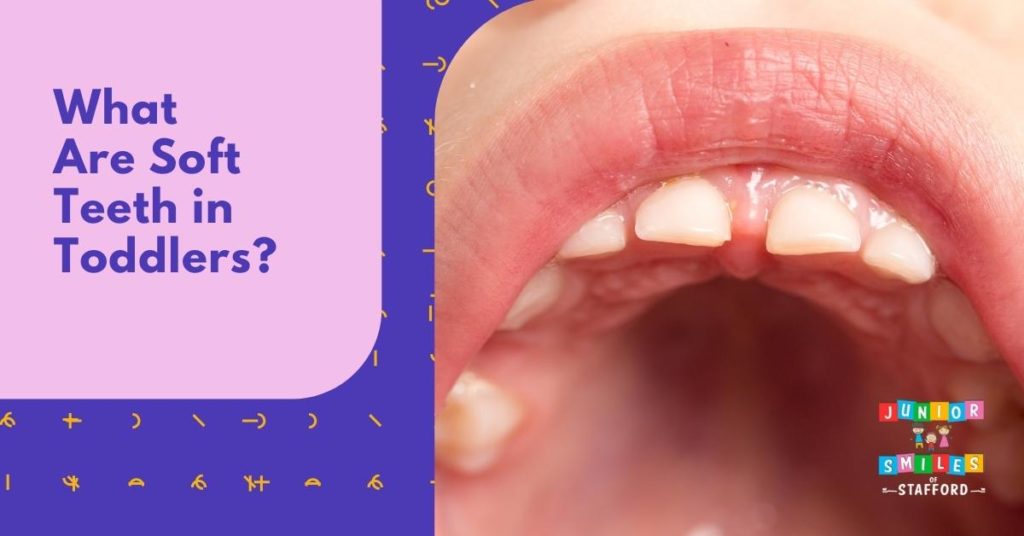What Are Soft Teeth in Toddlers?

Parents often ask, “what are soft teeth? Are soft teeth a real thing or just a myth?” It is believed that parents or relatives inherited this condition to their children. Is it possible for your children to inherit tooth decay and dental cavities from you?
Find out by reading this blog!
What Does Having Soft Teeth Mean?
Usually, when someone describes their teeth as “soft,” they’re referring to a problem or a weakened enamel. Tooth enamel is its toughest coating, so when it is worn away or damaged, the softer inner layers can be seen beneath the surface.
The pulp’s delicate inside may be exposed if the damage is substantial. There is a risk of tooth sensitivity to warmth and cold, which can cause pain and discomfort. Lacking protective tooth enamel might also be described as “soft” by a dentist.
What Causes Weak Teeth in Toddlers?
People with weak tooth enamel generally assume that genetics is to blame for their poor oral health care. It’s a must to check if there are signs of tooth decay since genetically soft teeth are unusual.
Here are some common reasons for tooth decay and poor oral health in kids:
Oral Hygiene Habits
A neglected oral health routine can lead to further dental health issues. Being unable to take care of your teeth properly, bacteria in the mouth produce acid, which damages tooth enamel, allowing decay to begin.
It would be best to use a quality toothbrush such as a soft-bristled toothbrush so you gently remove bacteria and plaque from teeth. It is essential to teach your kid how to brush correctly and to avoid scrubbing too hard—brushing too hard results in enamel wear, which increases the chances of tooth decay.
Fever
You may not be fully aware of this, but childhood fever can adversely affect your child’s teeth growth. Having a severe fever can actually prevent the cells responsible for remineralizing the teeth from completing their job correctly. This may result in teeth absorbing fewer minerals; thus, a weaker enamel. It would be best to prevent fever in children; give them vitamins and plenty of water. Make sure to always check up on your child!
Nutrition
Poor diet equals poor oral health. If your child’s diet has lots of sugar, this could raise oral health risks. Don’t worry; your kid can still enjoy these sweets, but make sure to consume them in moderation. Remember, too many acidic foods or sugar exposure contributes to dental decay development.
Enamel Fluorosis
Enamel Fluorosis can happen if a child is excessively exposed to fluoride during the early stages of their teeth development. This can make their teeth weaker and less robust than other kids their age. It would be best to consult with your pediatric dentist. They can quickly identify if it’s enamel fluorosis as soon as your child’s tooth eruption happens.
Cross-contamination
Sharing food, utensils, or cups can spread bacteria that cause cavities from one person to the next, most commonly from a parent to their child. Don’t let your child have anything that has come into contact with your saliva to avoid cross-contamination. Also, please take note that brushes are also not for sharing!
Read More: Why Do Toddlers Grind Their Teeth and What Can Be Done to Stop It?
Other Factors Contributing to Soft Teeth
External influences can also weaken the teeth and the enamel, resulting in soft teeth. The following are a few examples of potential factors:
- Injury to teeth – The enamel and strength of a tooth can be compromised by dental trauma, such as a chipped or broken tooth.
- Improper dental hygiene routine – Brushing way too hard or using a hard bristle toothbrush can lead to damage.
- Acid Reflux – Acid that comes up to your mouth can cause damage to teeth and enamel.
- Teeth grinding – Involuntary nighttime teeth clenching can wear away at the tooth’s enamel.
Preventing Soft Teeth
Some disorders cause soft teeth that you can’t prevent, but you can always prevent tooth decay!
- Brush your teeth twice a day using fluoride toothpaste.
- Use interdental equipment such as dental floss or water flosser to clean between your teeth at least once each day.
- Ensure to eat a wide variety of fruits, veggies, and low-fat dairy products.
- Limit your snacking between meals, which can expose your teeth to acidic items.
- Cleanings at the dentist are advised at least twice a year.
- This helps avoid dry mouth, which increases the risk of cavities, by drinking fluoridated water that protects teeth from decay.
- To prevent acidic and bacterial-infested beverages such as soda, juice, or sports drinks, one should limit their intake of sugary drinks.
Contact Junior Smiles of Stafford to know more about how to treat cavities in baby teeth.
Preventing tooth decay is possible. Contact a pediatric dentist if you notice signs of tooth decay or have any other concerns about your child’s dental health. Your child’s teeth can last a lifetime if they are cared for properly.
Read Next: Handling Loose Teeth: Is It Normal For Teeth to Wiggle?
Why Choose Junior Smiles of Stafford?
Our Stafford, VA team is well-versed in working with clients of various ages and backgrounds. They’ll take the time to get to know you and your family’s requirements, and they’ll work with you to design a treatment plan that suits your schedule. Sealants and fluoride treatments are just two of the many preventative care options we provide to keep your mouth healthy.
About Us
Visiting Junior Smiles of Stafford means you’re in good hands when it comes to receiving high-quality care. Your child’s dental health improves with each visit, ensuring a brighter smile for years to come. We adhere to the ADA and AAPD’s guidelines for best practices.
Where Are We Located?
Phone: (540) 699-2441
Fax: (540) 699-2464
Email: info@juniorsmilesofstafford.com
Monday and Tuesday: 9:00 AM – 5:00 PM
Wednesdays and Thursdays: 8:00 AM – 4:00 PM
Fridays and Saturdays: 9:00 AM – 2:00 PM (By appointment only)
How to Book Your Kids First Appointment at Junior Smiles of Stafford
Fill out the form on our website. Within 24 hours, a member of our team will get back to you.

